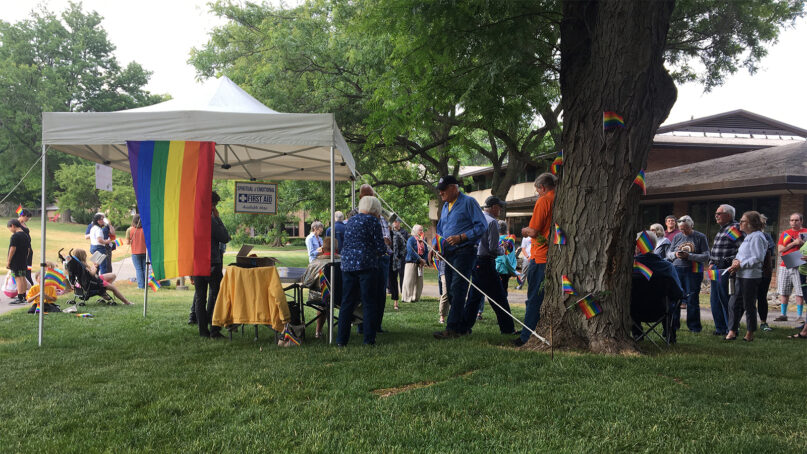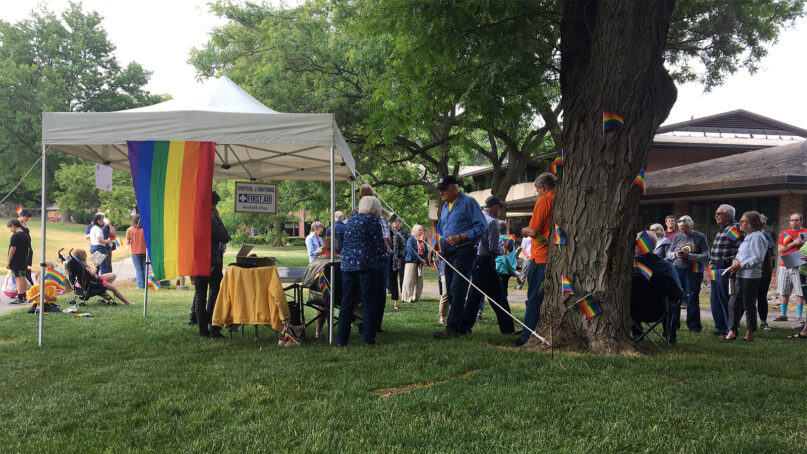
(RNS) — At least two dozen churches in the Christian Reformed Church of North America are in the process of severing their ties with the denomination over their disagreements with its increasingly rigid stance on sexuality.
Four Michigan churches have already sent resolutions of disaffiliation to a regional geographic body called the Classis Grand Rapids East, stating that they intend to leave. Leaders of an additional five Michigan churches, also in the regional body, said they were drafting their letters, which should be received by the classis’s next business meeting.
Outside of Michigan, 15 more churches are also planning to exit the denomination, which comprises some 1,000 churches in the U.S. and Canada.
The exodus is part of a larger sorting of Christian congregations across Protestant denominations over the past 30 years as a growing number of churches have opened their doors to full membership of LGBTQ members.
In June, at its 2024 churchwide meeting, known as a synod, the Christian Reformed Church instructed LGBTQ-affirming congregations to repent, retract any divergent statements and comply with the denomination’s prescribed beliefs on sexuality. Church leaders who spoken or advocated for LGBTQ affirmation, including pastors, elders and deacons, were placed on a limited suspension.
The crisis dates back to 2022, when the denomination accepted a report on human sexuality that recommended codifying its opposition to LGBTQ sex by elevating it to the status of confession, or a declaration of faith. At the synod later that year, the delegates voted to do just that.
Pro-LGBT demonstrators outside the annual synod of the Christian Reformed Church at Calvin University in Grand Rapids, Mich., June 14, 2023. (Photo by Grace Buller)
After waiting to see if the 2023 synod might accommodate churches with different views, Sherman Street Christian Reformed Church in Grand Rapids led the way to the exit. In its resolution it wrote: “Our policy of full inclusion is settled, as is our determination to allow space for a variety of views and to embrace the resulting tension.”
The church had already reallocated its financial giving or “ministry shares” away from the denominational entities as a first step, said the Rev. Jen Holmes Curran, the co-pastor. Instead, it donated to nonprofits that work with LGBTQ people experiencing religion-related trauma.
RELATED: Christian Reformed synod tells LGBTQ-affirming churches to repent or disaffiliate
The denomination’s Church Order, a document that gives guidance and sets rules for CRC churches, outlines a process for churches wanting to break away. First, church councils must agree to disaffiliate; then they must send a letter to the classis, which in turn must try to dissuade the congregation. If that effort fails, the church must hold two membership-wide votes before it formally disaffiliates.
Among those churches that have now drafted a resolution to disaffiliate is Neland Christian Reformed Church in Grand Rapids, which the denomination had tried to discipline for years for ordaining a deacon in a same-sex marriage.

People attend a community celebration at Neland Avenue Christian Reformed Church in Grand Rapids, Mich., June 7, 2023. (Photo courtesy of Otto Selles for Neland Avenue Christian Reformed Church)
“It’s very sad because in 99% of our doctrines we align (with the denomination),” said the Rev. Joel DeMoor, co-pastor of Neland Avenue. “The questions raised in care for the marginalized in this way have led to such an impasse. Whatever happens, I have no doubt we will stick to our mission: extending to all the deep welcome of Christ.”
The four churches whose resolutions of disaffiliation have already been received by the classis include Calvin Church, Grace Church, Church of the Servant and Sherman Street.
These Grand Rapids congregations have strong ties to Calvin University, with many influential faculty, provosts and former presidents of the flagship Christian Reformed Church school among their members. They include historians Joel Carpenter, George Marsden and Kristin Kobes du Mez as well as theologians Alvin Plantinga and Nicholas Wolterstorff.
Calvin faculty may attend non-Christian Reformed churches, though they are still required to subscribe to the Christian Reformed confessional stances or submit a statement of confessional difficulty, called a gravamen.
A denominational spokesperson acknowledged that “some are now in the process of disaffiliating, or are considering taking that step,” and said the denomination won’t know exactly how many for several more months.
Some disaffiliating churches are considering joining other denominations. The Reformed Church in America is an obvious alternative because it shares theological and historical roots with the Christian Reformed Church. Two years ago, 43 theologically conservative congregations in the Reformed Church in America split off from the denomination. But others include the United Church of Christ as well as the Presbyterian Church (U.S.A.) — denominations that allow for LGBTQ ordination and marriage.
In the U.S., the United Methodist Church is among the Protestant denominations with the biggest splits. In that denomination, 25% of its churches broke away, fearing the United Methodist Church was about to lift its LGBTQ+ bans on ordination and marriage, which it did earlier this year.
Some Christian Reformed Church congregations wanting to break away have already formed a new network to guide them. Called “Better Together,” the group provides resources and counseling to those churches.
RELATED: Calvin University board charged with examining faculty dissent

